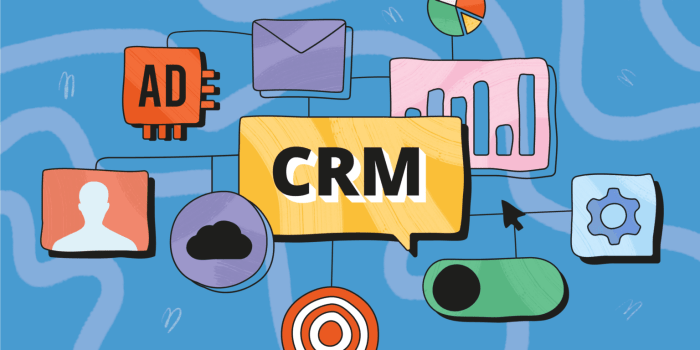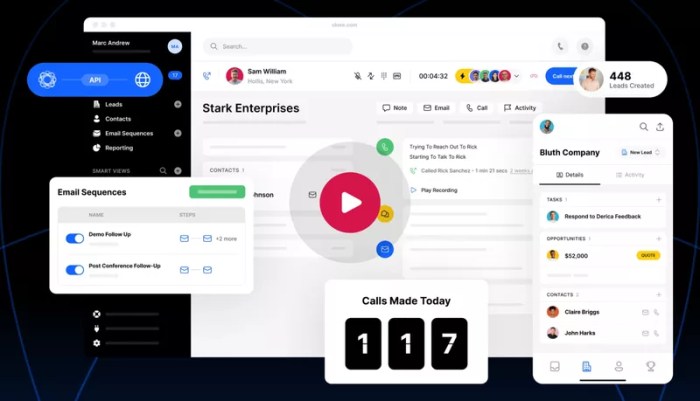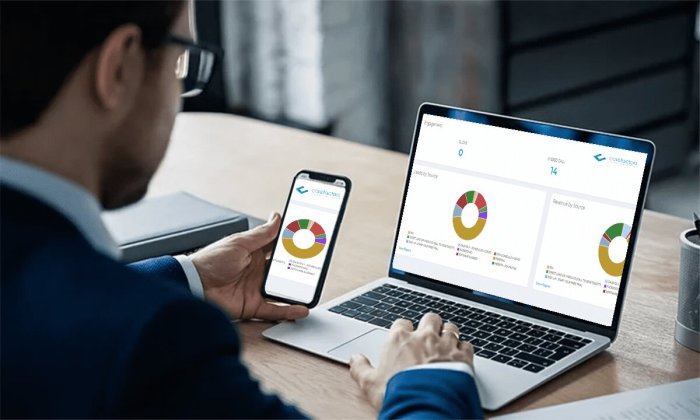Crm software for sales and marketing – In today’s competitive business landscape, effective customer relationship management (CRM) is paramount. A robust CRM software solution can significantly enhance sales and marketing efforts, streamlining processes, improving efficiency, and ultimately driving revenue growth. This comprehensive guide delves into the world of CRM software, exploring its features, benefits, and how it can revolutionize your business operations. We’ll cover various aspects, from choosing the right software to maximizing its potential for sales and marketing success.
Understanding CRM Software: The Core Functionality
At its heart, CRM software is a centralized system designed to manage and analyze customer interactions and data throughout the customer lifecycle. This encompasses everything from initial contact to post-sale support. Key functionalities typically include:
Core CRM Features:
- Contact Management: Storing and organizing detailed information about customers, including contact details, communication history, and purchase history. This allows for personalized interactions and targeted marketing.
- Lead Management: Tracking potential customers from initial inquiry to conversion. This involves lead scoring, qualification, and assignment to sales representatives.
- Sales Automation: Automating repetitive tasks such as email marketing, follow-ups, and reporting, freeing up sales teams to focus on higher-value activities.
- Marketing Automation: Automating marketing campaigns, including email sequences, social media posting, and targeted advertising. This helps nurture leads and improve conversion rates.
- Customer Service Management: Managing customer inquiries and support requests through various channels, such as email, phone, and chat. This improves customer satisfaction and loyalty.
- Reporting and Analytics: Generating reports and dashboards to track key performance indicators (KPIs) and gain insights into sales and marketing performance. This allows for data-driven decision-making.
- Integration Capabilities: Integrating with other business applications, such as email marketing platforms, e-commerce systems, and accounting software, for a seamless workflow.
Benefits of Implementing CRM Software for Sales and Marketing
Implementing a CRM system offers a multitude of benefits for both sales and marketing teams. These advantages translate directly into improved business performance and increased profitability.
Benefits for Sales Teams:
- Increased Sales Productivity: Automation of repetitive tasks allows sales reps to focus on closing deals and building relationships.
- Improved Lead Qualification: CRM systems help identify and prioritize high-potential leads, increasing sales conversion rates.
- Enhanced Customer Relationships: Personalized communication and targeted follow-ups strengthen customer relationships and build loyalty.
- Better Sales Forecasting: Accurate data and analytics provide insights into sales trends and allow for more effective forecasting.
- Streamlined Sales Processes: Centralized information and automated workflows improve efficiency and reduce errors.
Benefits for Marketing Teams:
- Targeted Marketing Campaigns: Detailed customer segmentation allows for highly targeted marketing campaigns with improved ROI.
- Improved Lead Nurturing: Automated email sequences and personalized messaging nurture leads and guide them through the sales funnel.
- Enhanced Campaign Measurement: Tracking and analyzing campaign performance provides valuable insights for optimization.
- Better Customer Understanding: Data analysis reveals customer preferences and behavior, enabling more effective marketing strategies.
- Increased Marketing Efficiency: Automation of marketing tasks frees up marketing teams to focus on strategic initiatives.
Choosing the Right CRM Software: Key Considerations
Selecting the right CRM software involves careful consideration of several factors. The ideal system will align with your specific business needs and budget.
Factors to Consider When Choosing CRM Software:
- Business Size and Needs: Small businesses may require a simpler, more affordable solution, while larger enterprises may need a more robust and scalable system.
- Budget: CRM software comes in various price ranges, from free options to enterprise-level solutions. Consider your budget and choose a system that offers the best value for your investment.
- Features and Functionality: Identify the specific features you need, such as contact management, lead management, sales automation, and marketing automation. Choose a system that offers the functionalities essential for your business.
- Integration Capabilities: Ensure the CRM system integrates seamlessly with your existing business applications, such as email marketing platforms, e-commerce systems, and accounting software.
- Scalability: Choose a system that can grow with your business. Consider the potential for future expansion and ensure the CRM system can handle increased data volume and user activity.
- User-Friendliness: The CRM system should be easy to use and navigate for all users. Consider the user interface and the overall user experience.
- Customer Support: Choose a provider that offers excellent customer support and readily available documentation.
Types of CRM Software: On-Premise vs. Cloud-Based
CRM software is primarily offered in two deployment models: on-premise and cloud-based (SaaS).
On-Premise CRM:
- Definition: Software installed and maintained on your company’s servers.
- Pros: Greater control over data security and customization options.
- Cons: Higher upfront costs, requires dedicated IT infrastructure and expertise for maintenance.
Cloud-Based (SaaS) CRM:
- Definition: Software accessed via the internet, hosted by a third-party provider.
- Pros: Lower upfront costs, easier maintenance, accessibility from anywhere with an internet connection.
- Cons: Reliance on internet connectivity, potential security concerns (though reputable providers have robust security measures).
Maximizing the Potential of Your CRM System
Implementing a CRM system is only the first step. To fully realize its potential, you need to effectively utilize its features and integrate it into your overall business strategy.
Tips for Maximizing CRM Effectiveness:, Crm software for sales and marketing
- Data Entry Best Practices: Ensure accurate and consistent data entry to maintain data integrity and accuracy of reports.
- User Training and Adoption: Provide thorough training to all users to ensure they understand how to effectively use the system.
- Regular Data Cleaning: Regularly clean and update your CRM data to remove duplicates and outdated information.
- Integration with Other Systems: Integrate your CRM system with other business applications to streamline workflows and improve efficiency.
- Continuous Monitoring and Optimization: Regularly monitor system performance and make adjustments as needed to optimize its effectiveness.
- Setting Clear Goals and KPIs: Define specific goals for your CRM implementation and track key performance indicators (KPIs) to measure success.
Frequently Asked Questions (FAQ): Crm Software For Sales And Marketing
Here are some frequently asked questions about CRM software for sales and marketing:

Source: snov.io
- Q: What is the cost of CRM software? A: The cost varies greatly depending on the vendor, features, and deployment model (cloud-based vs. on-premise). Expect a range from free options for small businesses to thousands of dollars per month for enterprise-level solutions.
- Q: How long does it take to implement CRM software? A: Implementation time depends on the complexity of the system and the size of your business. It can range from a few weeks to several months.
- Q: What are the key benefits of using a CRM? A: Improved customer relationships, increased sales productivity, better marketing campaign effectiveness, enhanced data analysis, and streamlined business processes.
- Q: Is cloud-based CRM more secure than on-premise CRM? A: Reputable cloud-based CRM providers invest heavily in security measures, often exceeding the security capabilities of many smaller businesses. However, the choice depends on your specific security requirements and risk tolerance.
- Q: How can I measure the ROI of my CRM investment? A: Track key performance indicators (KPIs) such as sales conversion rates, customer acquisition costs, customer lifetime value, and marketing campaign ROI.
Conclusion
CRM software is a powerful tool that can significantly enhance your sales and marketing efforts. By carefully selecting the right system and effectively utilizing its features, you can improve customer relationships, boost sales productivity, and drive significant revenue growth. Investing in a CRM is an investment in the future success of your business.
Call to Action
Ready to transform your sales and marketing processes? Contact us today for a free consultation to discuss your CRM needs and find the perfect solution for your business!
Helpful Answers
What are the key features to look for in CRM software?

Source: storychief.com
Essential features include contact management, lead tracking, sales pipeline management, marketing automation tools, reporting and analytics dashboards, and integration capabilities with other business systems.
How much does CRM software typically cost?
Pricing varies widely depending on the features, scalability, and vendor. Options range from affordable cloud-based solutions to more expensive enterprise-level systems with extensive customization.
How long does it take to implement CRM software?
Implementation timelines depend on the complexity of the system and the size of the organization. Smaller businesses might implement a system in weeks, while larger enterprises may require several months.

Source: corefactors.in
What is the best CRM software for my business?
The “best” CRM depends on your specific needs and budget. Consider factors like the size of your business, your sales and marketing processes, and your technical capabilities when making a selection.
